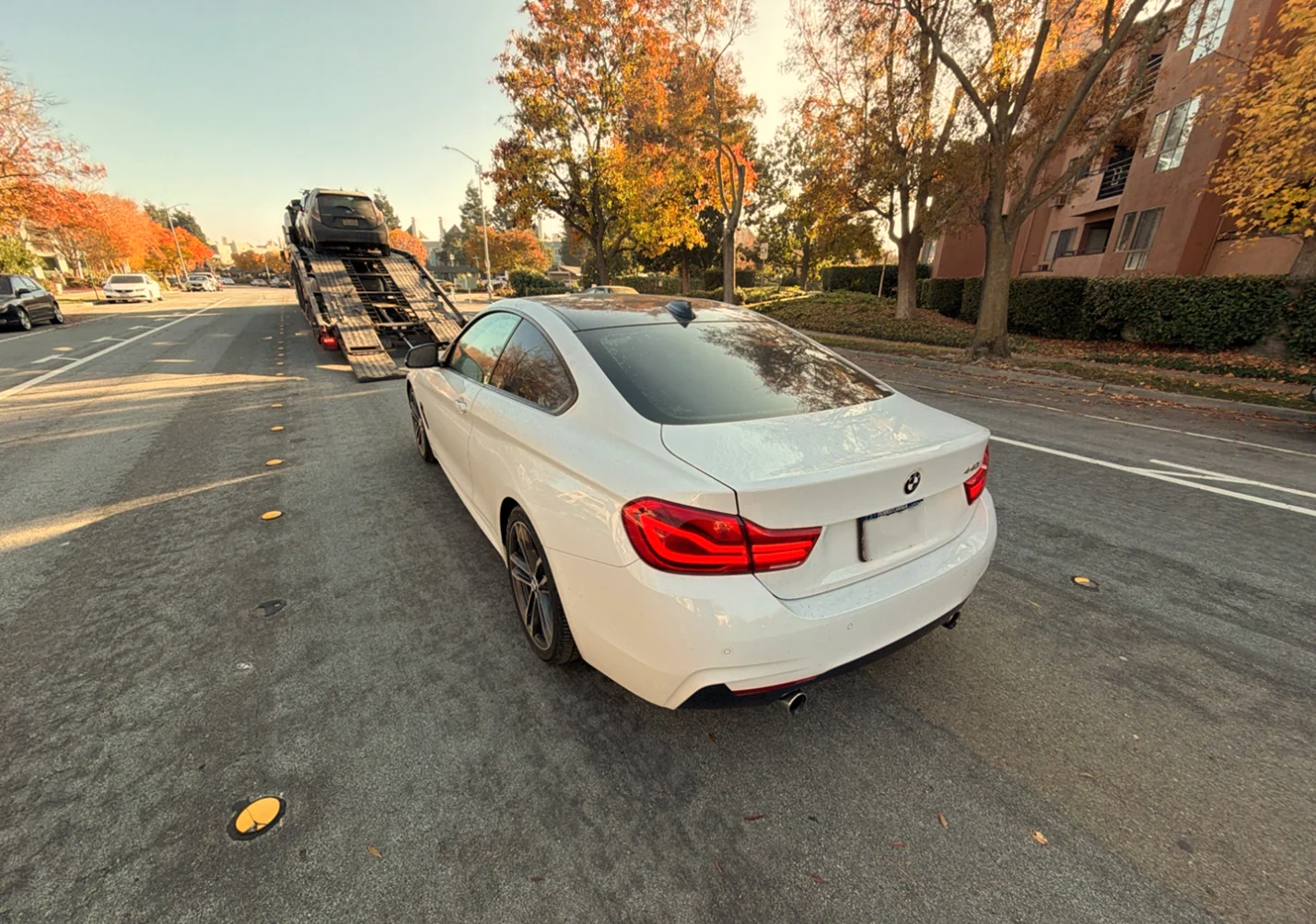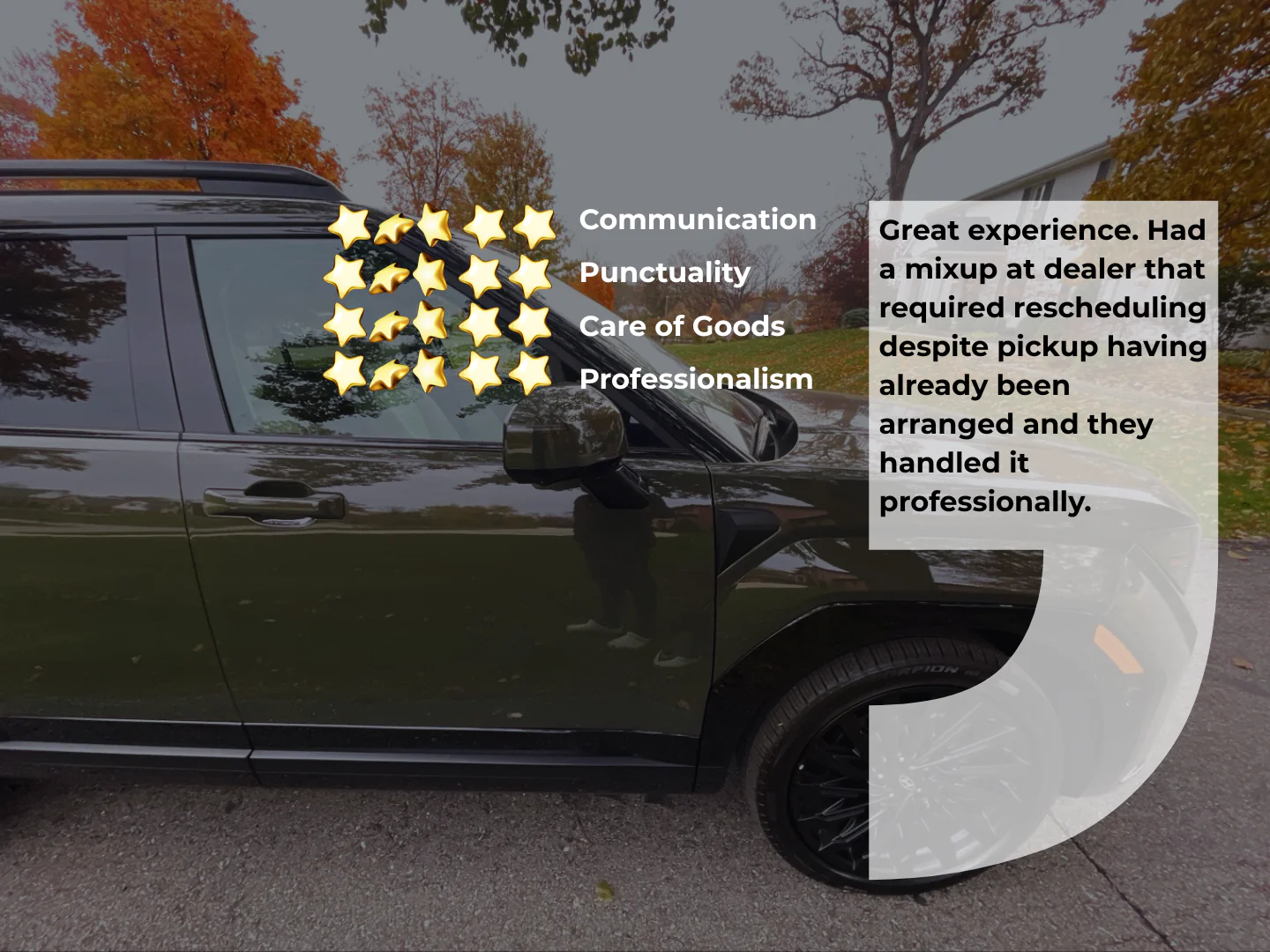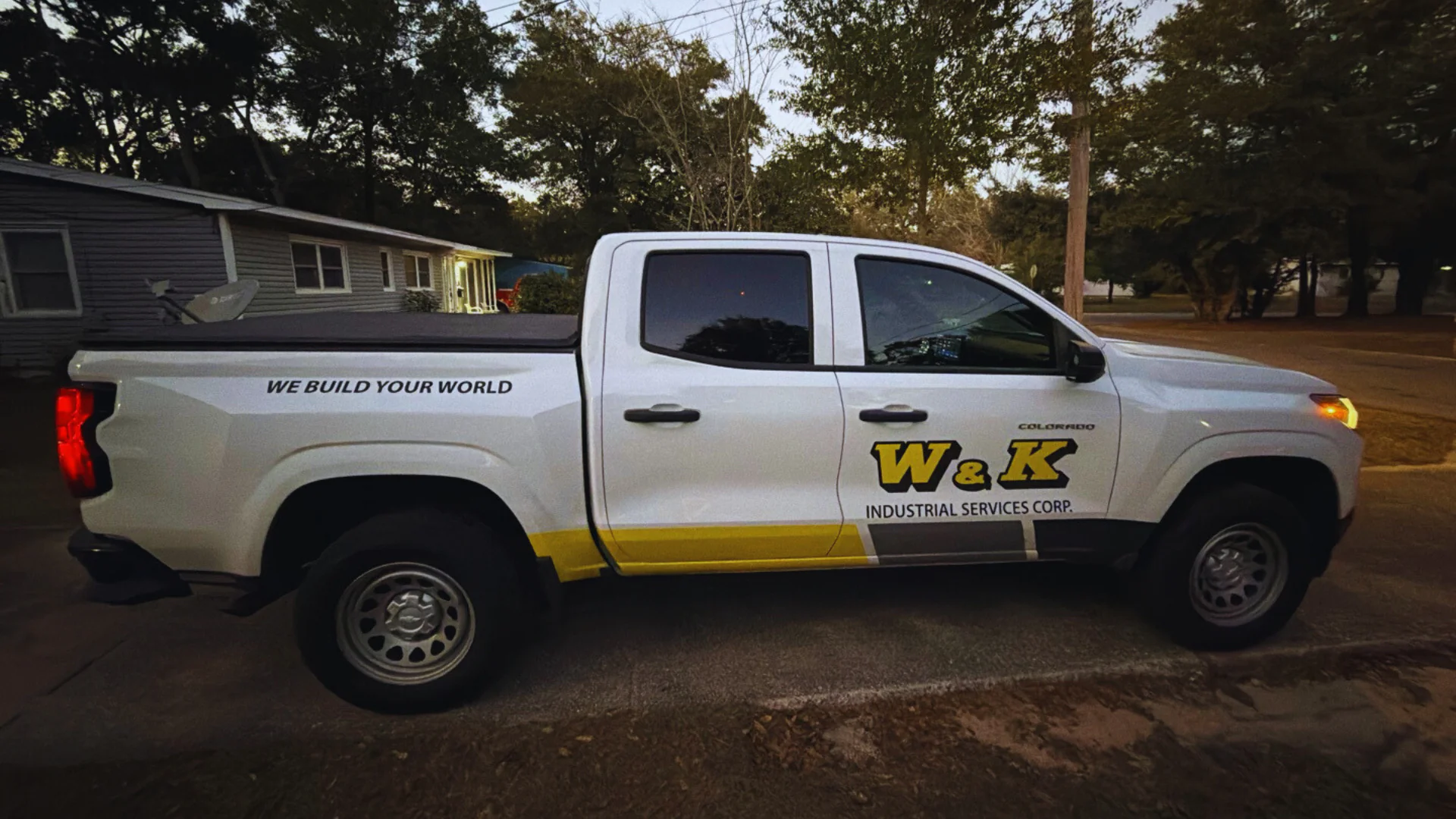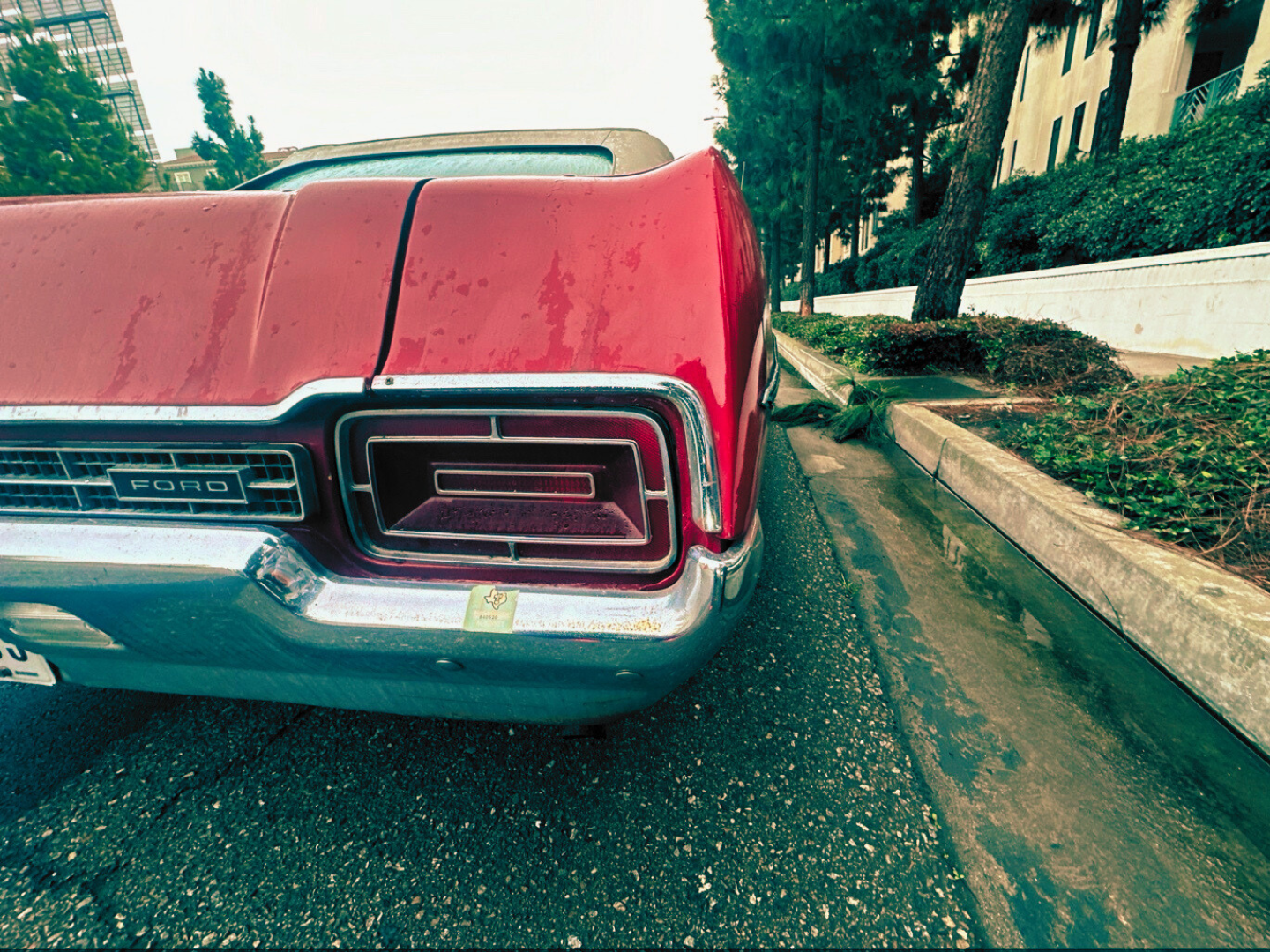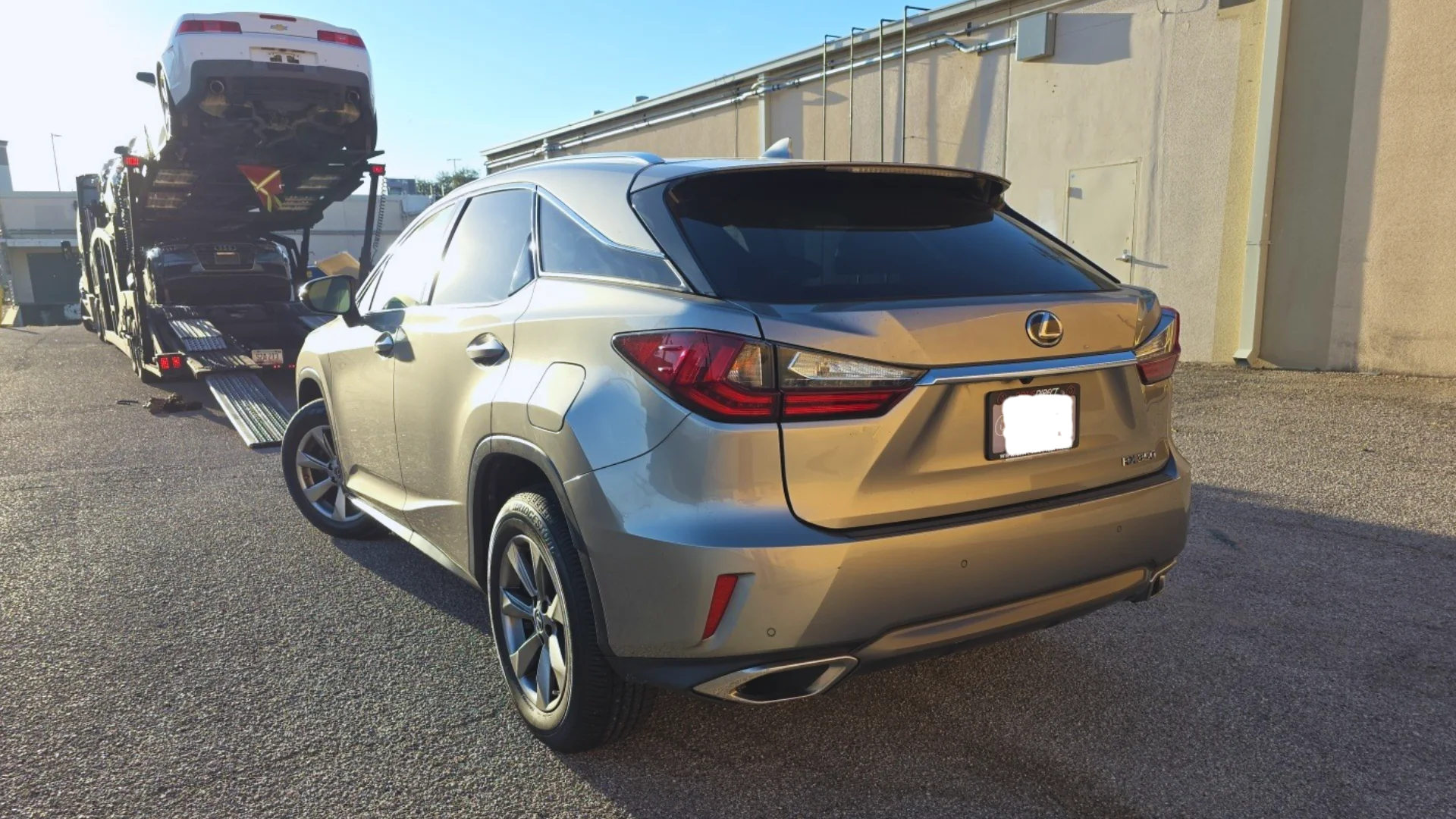Common Challenges Associated with Motorcycle Transport
If you are shipping for the first time, it’s not easy to entrust your prized motorcycle to a company you are unfamiliar with, whether you want it for a local move or to get delivered to another state. Additionally, anxiety may exacerbate when you become more familiar with challenges and common mistakes that arise when shipping your motorcycle.
However, you may relieve the stress of having your motorcycle shipped across the country by having a reliable vehicle transport company, like Tempus Logix, do it for you. Of course, it’s pretty difficult to anticipate all potential issues accompanying the motorbike transport process. Still, here we have made up a list of the most common difficulties you may encounter during it.
Delayed Delivery
Failure to deliver the motor vehicle on schedule is one of the most prevalent issues with transport companies. However, falling behind on agreed delivery time is not necessarily a carrier’s fault since various factors, such as extreme weather, traffic jams, or accidents, may come in the way. Depending on the cause, the delay might be from hours to days to weeks, but the shipper should contact the customer to detail the issue and make some form of compensation. Examples of it can be a discount for the next shipment or lowered expense for the current transaction.
Considering a Suitable Motorcycle Transport
With so many transport companies nationwide offering motorcycle shipping, an internet search may rapidly become overwhelming. Plus, it’s also possible to misinterpret the information and decide on the wrong company. For instance, when it comes to motorbike transport, the first question you should ask yourself is if the company you’re considering is a shipper or a brokerage organization. Working with a broker may save you the time and effort of calling multiple shippers and comparing prices to locate the best choice for you. A reputable broker will go through your preferred options, head for answers to all your queries, and help you decide on the shipper. The process happens faster when having brokers do the service because they virtually have an unlimited network of drivers, conversely to shippers with their trucks.
Study Pick-Up and Delivery Options
A broker may also assist you to consider whether you need door-to-door delivery or transportation between distribution centers, whether you need an open or enclosed trailer or when to choose pick-up and delivery dates. When shipping your bike, one of the most significant decisions you’ll have to make is whether to choose an open car shipping or enclosed auto transport. Whereas an open carrier exposes your motorcycle to external dangers, an enclosed trailer gives peace of mind and adds more protection against the weather and road debris. If the distance carried by a driver is relatively short, an open trailer may be fine, but over long distances, an enclosed trailer may be a better option for motorcycles.
Mistakes to Avoid During a Motorbike Shipping
Failure to Provide Necessary Documentation: When you arrange to transport your motorbike, the shipping company will likely require mandatory documentation, such as vehicle registration. Thus, if you don’t want to delay the shipping process, we strongly advise having the necessary documentation right at hand. At the pick-up location, the carrier will check your motorbike for any existing damage or scratches. You may observe the driver inspecting it for both of you to mentally record the condition before it gets into/onto the trailer. Also, make sure everything reflects on the final report, BOL. This document is proof of your motorcycle’s initial condition.
Insurance: Having an insurance policy when shipping your motorcycle is not legally required. According to the US Department of Transportation, carriers are responsible for having liability insurance. However, this only applies to the actual carrier companies and not the brokers that organize the logistics. Also, be informed that personal belongings left in the car are not subject to insurance coverage. Check with the auto transport company to know what is covered and what is not. Please make sure the insurance amount is proportional to the cost of the motor vehicle. Not all companies can handle the expensive load.
Considering Motorcycle Shipping Cost: Companies that advertise inexpensive rates for moving your motorcycle may sound attractive, but you should know what you’re getting for your money. The cheapest alternatives aren’t necessarily the best; in fact, they might occasionally indicate inferior quality. Open transport, for example, might save money on shipping, but it’s not always the best solution for keeping your two-wheeler safe. Before making any motorcycle transport arrangements, consider the distance between drop-off and pick-up locations, the number of stops along the trip, and other variables impacting safety at the expense of a low price.
A Guide on How to Transport a Motorcycle
A long, refreshing drive on the US’s highways is an unparalleled enjoyment for motorcyclists. But the truth is, not all bike trips are enjoyable and refreshing, as some might be distant, hazardous, and overwhelming.
Whether a home relocation or a short vacation, driving won’t be the wisest call if a motorcyclist wants to have their bike on board. Hiring a motorcycle shipping company is the smoothest and fastest way to get a bike delivered to any required destination easily.
So, here, we’re pointing out everything a bike owner has to know about transporting a bike. This guide will cover the following steps:
- Find a reliable transport company
- Decide on the trailer type
- Decide on the shipping service
- Order transport quotes
- Prepare the motorbike for shipping
- Document the bike’s condition
- Crate the motorbike
- Auto transport companies’ recommendation
1. Find a reliable transport company
Transporting a motorbike isn’t less challenging than shipping a car or heavy-duty equipment; it requires a professional and experienced motorcycle shipping company. So, a bike’s owner has to be patient and never settle for a company until the following standards are met:
What to look out for in a motorcycle shipping company
● License and Registration
A license and registration are required for the commercial vehicles that motorcycle shipping companies utilize to safely and legally operate nationwide. The two parties concerned with overlooking shipping companies are the Federal Motor Carrier Safety Administration (FMCSA) and the Department of Transportation (DoT.), so a reliable shipping company must be licensed and registered with these two parties; confirming this is possible by requesting the company’s USDOT number and run a check on the FMCSA’s website.
● Solid Reputation
A trustworthy, professional motorcycle shipping company will never be put out of sight; its name will be prominent in the bike shipping industry. A well-known, recognized company wouldn’t have earned such popularity if its services weren’t well-received by all clients who have hired it before.
Reliable review sites such as Google, Facebook, BBB, etc., would provide a clear insight into a company’s reputation and what previous clients have to say about it.
● Long Experience
Trusting a fresh, poorly experienced shipping company with a precious possession such as a motorcycle will guarantee the worst consequences. The inefficiency of a motorbike shipping company might result in the vehicle’s damage, no commitment to pickup and delivery dates and times, and a poor bike shipping experience in general.
That’s why one must look for a company that’s experienced in shipping motorcycles and has been in the industry for many years. A seasoned auto transport company will have the most advanced carriers, the best-sophisticated shipping techniques, and highly experienced drivers.
So, chances for damage or irresponsibility aren’t at all there. Tempus Logix is an auto transport company that matches all standards and requirements for a reliable shipping company; it has transported above 45,000 vehicles safely and successfully to different areas in the US.
● Fair Insurance
While no one can predict what the US highways and weather conditions might bring to the shipped vehicles, auto transport companies must give the client peace of mind. And that’s by offering proper insurance that protects their motorbikes during the pickup, journey, and delivery.
Auto shipping insurance could be fair, while others aren’t, so a client has to read a company’s terms and conditions to decide whether they’re suitable to their needs or whether they should buy additional insurance or look for another motorcycle shipping company.
2. Decide on the trailer’s types
Motorbike shipping companies have two carrier options for transporting a vehicle, an open and enclosed trailer. Each trailer type ensures a different level of protection and comes at a separate fee.
Enclosed trailers are recommended when transporting a bike under severe weather conditions, hot or cold. This option prevails as harsh weather conditions can negatively affect the shipped bike’s interior and exterior.
In addition, an enclosed carrier is a good option if a client owns a vintage or luxurious bike; if so, road hazards and weather conditions could dramatically affect the bike and result in scratches and damages.
Enclosed auto transport trailers provide 360-degree protection and leave no chance for any kind of damage. As a matter of fact, some enclosed trailers are temperature controlled and can keep shipped bikes in a medium temperature suitable to the surroundings.
On the other hand, open trailers are a good option for transporting regular motorbikes for short distances, as they’re cost-effective and convenient. However, bikes on an open trailer are exposed to external weather conditions, road hazards, and debris. Furthermore, bikes are strapped throughout the journey, so some bike accessories might get stolen in case a carrier driver stops for a break.
3. Decide on the shipping service
Bike shipping companies offer clients the choice to have their motorcycles picked up and dropped off from the company’s terminal or the client’s accommodation. These two options are known as terminal-to-terminal and door-to-door auto transport services.
By going for the terminal-to-terminal shipping service, a client has to travel with their bike to a distant terminal, usually in rural areas. This service exposes the motorcyclist and the motorcycle to damage, dangers, and accidents; however, it’s more money-saving and affordable than its counterpart.
On the other hand, the door-to-door auto transport service doesn’t require the client to move their vehicle or leave the comfort of their home; a carrier will come right to their home or office doorstep to pick up the vehicle with the least trouble and stress.
The door-to-door auto transport service is more expensive than the other as it requires the shipping company to obtain special permits for accessing residential areas. In addition, the bulky carriers operated by auto transport companies burn a lot of fuel during a trip.
The other shipping service, however, doesn’t require any additional effort from the company’s side. Rather, each client will be responsible for delivering and picking up their vehicle from a pre-arranged location. For this reason, there are no additional fees for this service; it’s affordable and recommended if a client can safely drive their bike for long distances.
4. Order transport quotes
One can get a professional service for a reasonable, economical price but must go the extra mile. Each auto transport company follows a different way of calculating its shipping quotes.
Some offer the best service for a big-budget price, while others can provide the same high-quality service level for a manageable quote. It doesn’t take more than ordering quotes from all reliable bike shipping companies and comparing them until receiving the most reasonable one.
However, bike owners have to remember that the shipping fee isn’t all that matters and isn’t what determines whether or not a service provider is reliable. Rather, clients have to consider all the standards mentioned above before reaching the level or ordering and comparing quotes.
5. Prepare the motorbike for shipping
The motorbike’s safety isn’t only the company’s responsibility; it’s a collaborative effort between a bike owner and a shipping company. A client’s part of the deal is properly preparing their bike for the long trip it’s about to undertake. And that’s by doing the following:
● Clean the bike’s body
Even if the bike is transported on an open trailer and gets exposed to the road’s dust and dirt, a motorcycle shouldn’t be hauled on the carrier’s back until it’s squeaky clean. When a client cleans their vehicle and removes all dirt that covers its body, all current scratches, dents, and dings will be revealed.
By that, both the client and the carrier driver will get to know the bike’s pre-shipping state and be able to spot new scratches and damages if they exist.
● Remove loose items
Whether the bike is in an enclosed or open carrier, the long, hazardous trip will put loose items in danger of getting damaged or lost. So, saddlebags, windscreens, and mirrors must be removed before the bike is picked up. It’s worth noting that all the insurance auto transport companies provide doesn’t cover loose items’ damage.
However, if removing loose items isn’t possible for any reason, a client can purchase additional insurance coverage to protect the parts that the original insurance doesn’t cover.
● Drain the fuel tank
A full fuel tank means additional weight; additional weight means a higher fee. In addition, the more fuel, the more the chances of leaks and spills. So, a bike owner has only to fill ¼ of the fuel, no more, no less.
Additional preparations include:
- Disabling the battery
- Disabling the alarm
- Properly inflating the tires
6. Document the bike’s condition
After cleaning and fully preparing the bike for transport, a client has to document their vehicle’s pre-shipping state. And that’s by pointing out all scratches, dents, dings, discolorations, and chips. All the damages and issues on the bike’s body must be included in the receipt the carrier driver gives to the client during the pickup; this receipt is known as the Bill of Lading (BOL.)
Once the bike is delivered, both the carrier driver and the car owner must inspect the vehicle and look for any new damages; if any damage of any kind is noted, the client shouldn’t sign the Bill of Lading and immediately reach out to the company for insurance coverage.
7. Crate the motorbike
A motorcycle crate is the best way to ensure a bike’s safety regardless of the carrier type a client goes for, open or enclosed; they work as a shipping container. Crates could be purchased, rented, or made. But because a crate’s price is somewhere between 300$ to 900$ and rental isn’t much more affordable, making a crate is the most affordable way many bike owners prefer.
The two popular crate materials are metal and wood; steel crates are light-weighted and provide a high level of protection; however, they don’t shield the shipped bike against harsh weather conditions. Wooden crates, on the other hand, are sturdy and ensure the highest level of protection but are harder to store than steel boxes.
No matter whether a bike owner goes for steel or wooden crates, the bike shipping company must be fully informed so they plan the haul and the shipment accordingly.
Best motorbike transport company recommendation
Finding the most reliable and trustworthy auto transport company for shipping the most cherished possession, a motorcycle, won’t be easy, especially with numerous shipping companies in the industry.
However, Tempus Logix is a leading auto transport company that has served clients all around the US for over eight years. Its previous clients’ reviews, as well as Transport Ranking, an auto transport ranking website, have proven that the quality of its services is unparalleled and among the best in the field.
Tempus Logix provides high-quality services and reasonable quotes that comply with the service quality and suit each bike owner’s budget.
Cross-Country BMW Car Transport from Hershey, PA to Fremont, CA: 2,800 Miles in Nine Days
The holiday seasons carry their own set of challenges when it comes to car transport. It is the peak requirement for car transport during the dates surrounding Thanksgiving and Christmas. Carrier availability becomes more difficult as the date in December draws near. However, one of the customers did everything correct. They booked their 2019 BMW 440i car transportation on November 16th. The pickup date was scheduled for December 1st in Hershey, Pennsylvania. The final destination was Fremont, California.
Why This BMW Shipment Stands Out
Here is what typically happens when someone books a cross-country car transport.
This owner of a BMW knew how the process went. They knew December was a busy month for auto transporters; more people are moving during the holidays than at any other time of the year.The smart move was booking on November 16th. We had ample time to find the right carrier for them. We were able to match them with a reliable driver who knew the route. The carrier was assigned on November 25th, which was only six days prior to the pickup. Everything worked just right.
The Route from Hershey to Fremont
This journey from Pennsylvania to California is approximately 2,800 miles. It stretches directly across the country. Typically, one travels via Interstate 80 West from Pennsylvania and Ohio. Next, it continues via Indiana and Illinois.
The Midwest part can be challenging during December. Snow and ice are also things to worry about, especially in states such as Nebraska, Wyoming, and others. Delays are more likely during this period. Our carrier, however, knew what they could expect. They looked at the weather predictions prior to leaving on their journey. The BMW 440i was collected on time on December 1st.
What Makes the BMW 440i Special for Transport
The 2019 BMW 440i car model is not just any car model. This car model is considered to be a luxury sports car that requires careful handling.
The car model has low ground clearance, which means that it requires extra care.
Regular car carriers are good for this version. The weight of the 440i is approximately 3,700 pounds. This is about right for typical auto carrier trailers.
The value matters too. A functioning vehicle with this model year and make could cost between $30,000 and $40,000 in respectable condition. Buyers want to be confident that their automobile is protected.
We suggested closed transportation in this case. Open transportation was chosen instead by the client. Sometimes, customers choose the cheaper form. Open transport was working quite well here. BMW car delivery was without problems. The carrier secured it well on its trailer.
The Nine-Day Journey Across USA
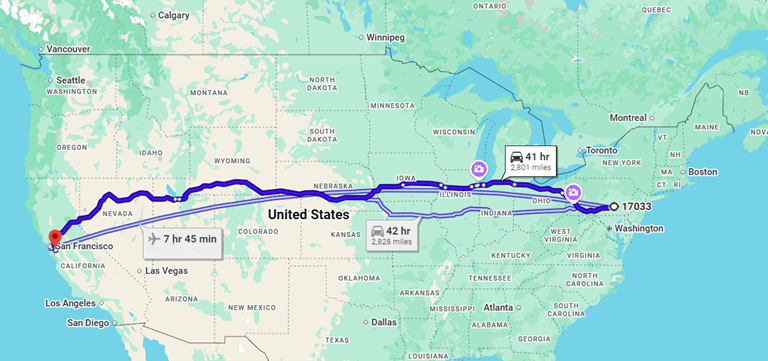
Most cross-country car shipments are done in 7-10 days. This BMW shipment was right on target. It was picked up on December 1st. It was delivered on December 10th.
This is nine days from Pennsylvania to California. The driver averaged about 300 miles per day. Federal regulations restrict the number of hours that truck drivers work each day.
The carriers cannot just drive straightforwardly. They require stopping for a nap and for fuel. Inclement weather is also factors for them.
December means shorter days and less daylight. Drivers like to commute during the day when the weather is clearer. No one wants to drive through the mountains during the darkness of night.
The I-80 route passes through some rough terrain. There are Sierra Nevada mountains near California that have to be navigated with care. Sometimes, the passes are closed due to snowfall during the winters. This consignment did not encounter severe weather conditions. The transporter planned everything properly. They checked the weather reports and adjusted their schedule accordingly.
Why Advance Booking Matters During Holidays
Everybody suddenly needs their car moved next week. The challenge is the availability of carriers. The better drivers are all booked in advance. The ones who know the routes sign up their carrier time slots quickly.
Last-minute bookings incur extra charges. Airlines charge high rates for rapid transportation. They involve themselves in extra stress and route planning.
This customer didn’t have to go through all that trouble. Booking on November 16th gave us ample options. This customer was able to get a good carrier within normal rates. The carrier assignment occurred on November 25th. It was still a week prior to the pickup. Everything was in order because no one was in a hurry.
What Made This Shipment Successful
There was perfect coordination of factors in this scenario. The advance booking was to our favor. The customer picked the right date to get the truck.
The route from Pennsylvania to California is popular. Providers offer services along this route frequently. This is because the demand is high.
The BMW 440i itself is not particularly tricky to transport. It is a normal size coupe. There were no special permits or equipment required by the carrier.
Communication was an important aspect too. The customer was involved throughout the process. The customer reacted promptly whenever we needed information. The carrier was keeping us informed along the way. We were aware of the exact whereabouts of the BMW. The customer was getting updates on the status.
Real-World Timing for Cross-Country Transport
People are often interested in the time it takes to ship something. The honest answer to this question depends on many factors, with distances being the most important.
Weather creates the biggest variable. A clear December week means faster transport, while snow and ice can add days onto the schedule.
In all, this shipment took nine days. That is actually very good for cross-country transport in the beginning of the winter. Some shipments during winter can take up to 12 to 14 days. The key is managing expectations. We set a timeline of 7-10 days with the customer, and that is what it took to deliver.
Transport Summary
Vehicle: 2019 BMW 440i
Route: Hershey, PA 17033 to Fremont, CA 94538
Distance: 2,800 miles (cross-country)
Primary Routes: I-80 W through Pennsylvania, Ohio, Indiana, Illinois, Nebraska, Wyoming, and Sierra Nevada mountains
Service: Open-air multi-car carrier
Cost: $1512.00 ($0.54 per mile)
Transit Time: 9 days (December 1 pickup – December 10 delivery)
Season: Autumn-Winter
Hyundai Santa Fe Car Transport from McDonough, GA to St. Louis, MO: Same-Day Delivery Despite Schedule Changes
A Hyundai dealership in Georgia was required to transport a brand new 2025 Hyundai Santa Fe from the dealership to a customer residence in Missouri. It was a challenging delivery due to the tight timeline and changes imposed on the dealership.

The customer later shared his experience with the transport company. He was pleased with how the staff reacted to an unexpected scheduling problem.
“Great experience. Had a mixup at dealer that required rescheduling despite pickup having already been arranged and they handled it professionally.”
Such adaptability is important when transporting vehicles from dealerships. Unforeseen changes occur without warning. A seasoned transporter will adapt to the changes without resulting in delays or frustration.
Route Planning For 600-Mile Same-Day Delivery
The distance between McDonough and St. Louis is approximately 600 miles. Most of the roads traveled will be I-75 North through Tennessee, and then I-64 West into the state of Missouri. It goes through Chattanooga and Nashville before reaching the St. Louis metro area.
Transportation companies map all these routes. This is done after careful consideration of traffic flow around major cities. Another factor is hours of service. This is regulated by federal law. This law sets the maximum hours that a driver may work in one day.
The method of transportation arranged for this delivery was same-day pickup and delivery. This means that from the dealership, the Santa Fe would set out in the morning.
The driver left early in order to beat the traffic in the Atlanta area. Interstate 75 is prone to congestion during the peak morning rush hours. Leaving before 7:00 AM enabled the driver to get out of the metro area before traffic became congested.
Coordinating with the Dealership: Streamlining Pickup at McDonough, GA
Car dealerships run on tight schedules. They process paperwork for several cars on a daily basis. They are also juggling test drive requests and service work. A transport pickup is an added layer.
The planned time for the pickup was 9:00 AM. All appeared to be in readiness for the pickup to take place when the dealer called with a complication to the plan. They required postponement of the pickup due to a documentation problem. The final inspection documentation of the car was not yet accomplished.
This is where most transportation companies go wrong. They could object to modifications or request additional costs. They could even void the transaction altogether. This is not how professional transportation companies treat such scenarios.
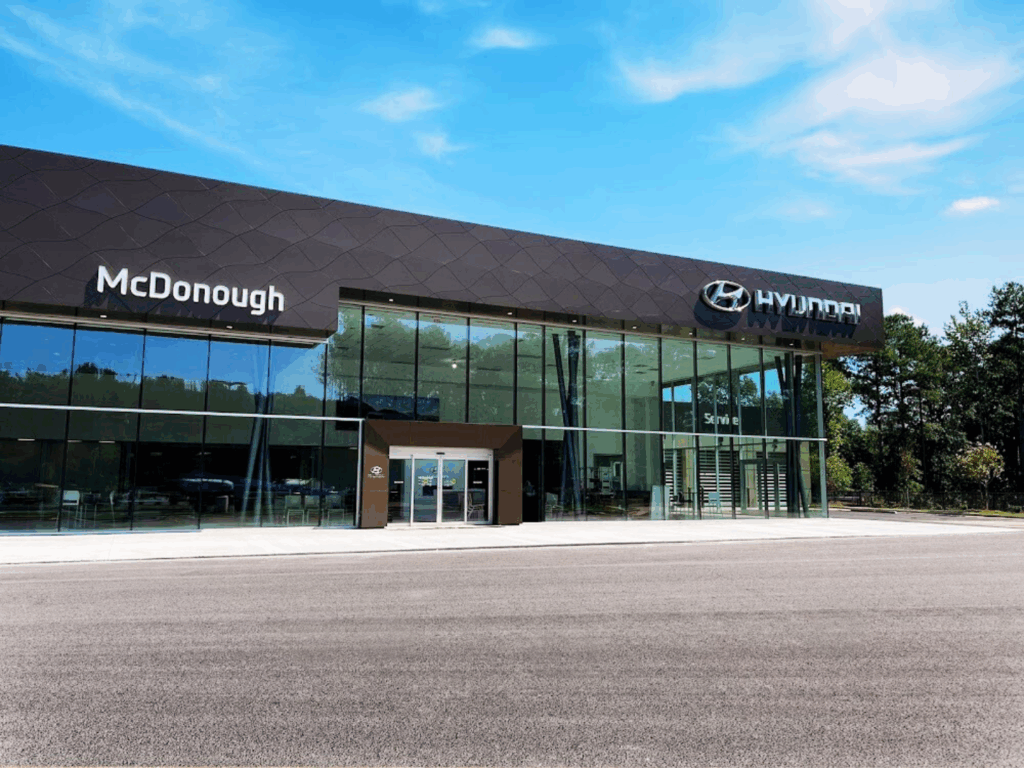
The driver Tempus Logix hired, cooperated with the dealership to find an alternative time for pickup. They were able to push the pickup time to 11 am. As a result, this provided the dealership with adequate time to complete all the paperwork. The driver modified the timing of the route to accomplish the same-day delivery. This impressed the customer. None of them asked for extra charges. None of them caused unnecessary stress.
Communication Excellence: Why Updates Are Important in Auto Transport
Communication is what sets good carriers apart from average ones. Customers like to see what is going on with their vehicle. They like updates if changes occur.
The transport company sent text messages throughout the day. There was a message to indicate the driver had set out for McDonough. Another message came to confirm the pickup at the dealership. Later, a message indicated the driver had entered Tennessee.
Such updates enable customers to plan their day. Customers understand approximately when to expect their delivery. They can make arrangements to be present at home when the delivery vehicle arrives.
The car transportation schedule maintained predictability because there was effective communication. One thing the customer knew was that their car expected to arrive in St. Louis between 6 PM and 7 PM. They were thus able to finish work and return home.
Some companies only contact when something goes wrong. This leads to stress. Updates help to instill confidence that all is going well.
The Residential Delivery Experience: Arriving in St. Louis, MO
The driver arrived at St. Louis. The customer was called by the driver along the highway to confirm the destination of the delivery. He arrived at the house after 20 minutes.
Residential deliveries are more time-consuming than terminal deliveries for dropping off packages. The driver will have to drive along neighborhood roads to reach the destination. The driver will look for a suitable location to park the vehicle and drop off the package.
There was no trouble with this particular delivery. The customer’s road was spacious enough to allow the transport trailer to pass. The delivery man off-loaded the Santa Fe and performed the final check with the customer. They examined the car jointly to find if there was any damage to it. All appeared to be in order.

The customer signed documents for delivery. The driver gave the customer copies of all documents. The driver responded to questions regarding the vehicle and the transportation of goods. The overall time for unloading was 15 minutes.
The customer left satisfied with the level of service and received the new Hyundai on time, in spite of the morning delay. The customer received frequent updates all day. The customer worked with a team of professionals that managed unexpected transitions without making things more difficult.
Shipping Summary
Vehicle: 2025 Hyundai Santa Fe
Route: McDonough, GA to St Louis, MO (600 miles)
I-75 N (McDonough, GA → Atlanta → Chattanooga, TN) → I-24 W (Chattanooga → Nashville, TN) → I-64 W (Nashville → St. Louis, MO)
Service: Multi Car Hauler | Open Trailer
How Open Transport Delivered a Luxury Mercedes Safely: Car Shipping from Huntington Beach, CA to Hull, MA
An example of a coast-to-coast car transport of 2023 Mercedes S-Class vehicles from Huntington Beach, California, to Hull, Massachusetts. This one demonstrates the risks and elements associated with the “guaranteed pickup” service within a short time frame, such as 48 hours, during the busiest time of the year, which is the last week of December. The open transport service, instead of the enclosed transport, saved almost $1,000 while still allowing the transport of the luxury vehicle within the short time frame of nine days over 3,015 miles.
The Guaranteed Pickup Nobody Saw Coming
Most people don’t know what “guaranteed pickup” means. This isn’t some fancy jargon we use for marketing.
We are talking about standard transport here. If you book standard transport, we will find a carrier if one is available. It could take three days. It could take one week. The driver collects your car when he passes by your area.
Guaranteed pickup is different. Guaranteed pickup is when we guarantee a certain date. The carrier is committed to guaranteed pickup, regardless of circumstance. Missing it means you won’t be billed.
This customer placed their booking on the 6th for pick-up on the 8th. This is close. So close it hurts. To find a carrier who has room on their trailer, who is already scheduled on a cross-country run, and whom they can reach within 48 hours, at Huntington Beach? This is work. However, the price for guaranteed service is higher for a reason. We were tasked with making it happen. A carrier was assigned on the 8th of December, and it was picked up on the same day.
Why Open Transport Made Sense Here
Here’s what car dealerships don’t want you to know. Enclosed transportation is excellent, but not always required.
The 2023 S-Class starts at about $115,000. Most car enthusiasts hear that price tag and immediately lock their minds onto the idea of an enclosed trailer. It just sounds safer, you know? Weather protection. Privacy. All the high-end amenities.
Yet how about the process of getting there? The car is shipped on a trailer. It travels across the country on the highways. That’s all.
Open trailers will expose your vehicle to the same elements that you would experience driving through. Rain, dust, maybe some snow. Nothing that your car wasn’t designed to deal with.
This carrier in particular operated a 9-car hauler. A professional outfit that operates cross-country routes every week. They loaded the Mercedes onto the top deck. This is important because road debris kicks up from underneath, so it is better if it is on top. The customer was saving approximately $900 to $1,000 more with the open than the enclosed option. The S-Class was delivered in pristine condition. Not all practical decisions are wise choices.
Three Thousand Miles in December

Huntington Beach is literally right on the Pacific in Orange County. Hull is an intrusion into Boston Harbor, just south of the city of Boston. You can’t possibly get more coast-to-coast than these.
The route likely continued I-15 North into Nevada, then I-70 or I-80 East, depending on the weather. It’s hard to predict in December. Colorado can sneak up on you unexpectedly. Wyoming has blizzard conditions that can close whole interstates for days.
Little Rock usually proceeds more quickly. Kansas, Missouri, Illinois, and Indiana follow. Holes in traffic are big enough to enable good time to be made unless a high-volume route comes through. Averages may run 300 to 350 per day in good weather on the long hauls.
Then you get to the eastern states. Ohio, Pennsylvania, and then New York. By the time you get to Massachusetts, you’re running on empty and coffee from truck stops. It took this carrier nine days. Pickup date is December 8th. Delivery date is December 17th. Now, this is not bad at all, given that it is winter.
The Part About Risk Nobody Wants to Discuss
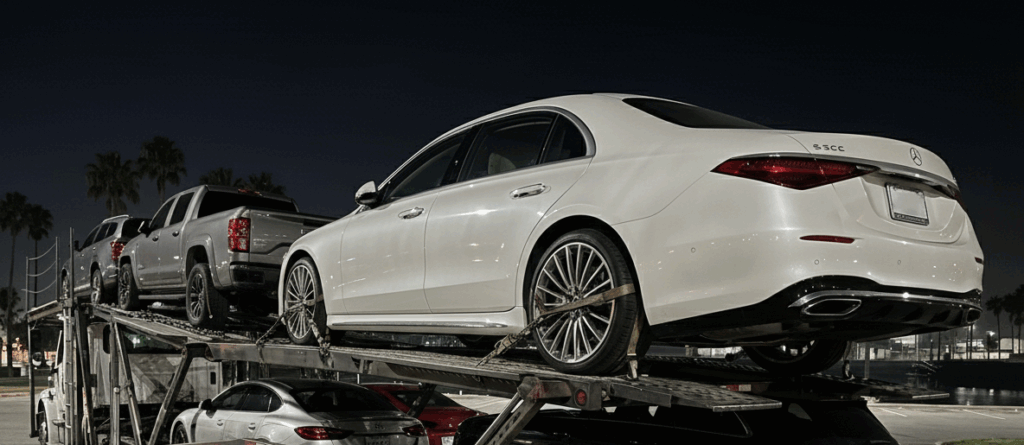
Shipping a brand-new S-Class on an open trailer makes some people nervous. The car costs more than most people’s annual salary.
The risk of damage doesn’t change all that much between open and enclosed transport. What does change is the exposure to weather and road conditions.
If the carrier knows what they are doing, then it doesn’t matter what kind of trailer it is; they secure the car properly. Soft straps. Proper weight distribution. Soft loading and unloading.
The biggest risk on open trailers is road salt in winter. Northeastern states dump tons of it on highways during December. If you leave it sitting there, it eats paint and metal. The S-Class came back clean. No damage. No issues. The customer saved a thousand bucks and got the same result that they would’ve gotten with enclosed.
What This Customer Got Right
It’s that guaranteed pickup which has enabled this whole thing to have happened. Without the commitment, there would have been just no way of finding a carrier in December within 48 hours.
Most customers should book a week or two in advance. That gives the carriers time to route and load accordingly. A guaranteed option does exist for situations like this where timing means everything.
It helped that he was flexible on the type of trailer. A lot of owners of expensive cars default to enclosed without considering it. He actually assessed the risks and knew an open transport would be good. Communication sealed the deal. The customer stayed available during the booking process. When everyone stays in touch, problems get solved before they become actual problems.
Transport Summary
Vehicle: 2023 Mercedes-Benz S-Class
Route: Huntington Beach, CA 90254 to Hull, MA 02045
Distance: 3,015 miles (coast-to-coast)
Primary Routes: I-15 N through Nevada, I-80 E through Wyoming, Nebraska, Iowa, Illinois, Indiana, Ohio, Pennsylvania, New York, to Massachusetts
Service: Open-air multi-car carrier (9-car hauler, top deck)
Cost: $1620 ($0.53 per mile)
Transit Time: 9 days (December 8 pickup – December 17 delivery)
Season: Winter
2025 Chevy Colorado Truck Shipping from Pensacola, FL to Moore, SC
A customer recently booked vehicle transport through our AI-powered price calculator. They needed to move a 2025 Chevrolet Colorado from Pensacola, Florida to Moore, South Carolina. The system calculated real-time market rates based on current carrier availability and route demand. Within hours of booking, we matched the shipment with an experienced carrier specializing in full-size truck transport.
Moving a brand-new Colorado requires careful planning. These trucks sit higher than standard sedans and weigh more than compact vehicles. The carrier assigned to this shipment had over eight years of experience hauling pickups and SUVs across southeastern corridors. Our residential pickup service meant the customer didn’t need to drive anywhere. The carrier arrived at the specified address in Pensacola ready to load.
The Heritage Of American Truck Manufacturing
The Chevrolet Colorado symbolizes years of truck design specialization by American automakers. General Motors has built this mid-sized truck so that it can serve as a daily vehicle for commuting as well as for weekend outings. The latest version of Chevrolet Colorado, which is expected in 2025, has enhanced safety features and improved towing capabilities.
Such trucks aren’t delicate vehicles. They’re made to withstand construction site environments, camping, and other similar purposes. However, this doesn’t mean trucking companies can handle them casually. New trucks should be treated in the same manner as other vehicles when they are shipped. Paint can be scratched. Mirrors may be broken. Components on the undercarriage may be damaged by improper loading.
The ground clearance of the Colorado measures around 8.5 inches depending on the model variant. This ground clearance will work quite well with most standard auto transports. There will be no need for low-angle trailers as used for sports cars. The truck mounted the trailer without any scratching issues.
The 2-Car Hauler Method: Strategic Approaches for Large Trucks
Trucks are quite voluminous and occupy larger spaces on the transport carriers. A conventional multi-car carrier will carry up to ten vehicles at a time. However, if some of the carriers are filled with trucks, the carrier will accommodate no more than six or seven vehicles at a time. This will affect the pricing because there will be reduced revenue for the carrier.
However, our carrier utilized a 2-car hauler for this particular shipment. Smaller trailers provide a degree of flexibility that larger haulers cannot provide for a company that transports as many vehicles as this carrier does on a daily basis. They can easily traverse residential roads that larger haulers would find extremely challenging. Additionally, they provide parking space that larger haulers could not accommodate. Furthermore, they offer rapid delivery services.
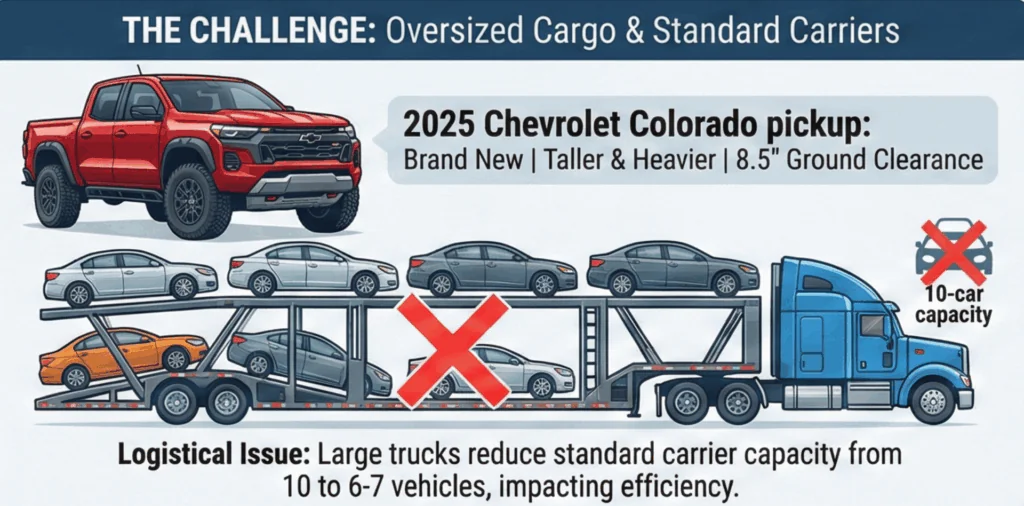
The 2-car trailer also makes loading and unloading much simpler. There are simply fewer vehicles being loaded or unloaded from the trailer. There were only two vehicles being shipped in this case. This increases the speed of pickup and delivery. The transport company does not have to make several stops along the route in order to deliver its freight. Two-car haulers will often employ an open transport configuration. These vehicles will sit exposed to the conditions of transportation. In the case of a completely new truck such as the Colorado, this method of transport proves to be acceptable.
The paint and clearcoat finish of this truck are durable enough for highway driving and do not require the extra protection of an enclosed transport method to keep it looking its best upon delivery to the buyer.
A 550-Mile Journey From Pensacola, Florida, To Moore, South Carolina
This ride goes to the northeast for approximately 550 miles. Usually, it would take a carrier one to two days to complete this journey in good weather. Starting in the morning from Pensacola,, the Colorado had reached Moore and was ready to be delivered.
Along the way, I-10 moves traffic east out of Pensacola through Mobile and into southern Alabama. The route then heads north toward Montgomery, cuts through Georgia, and slips into South Carolina. Road conditions along this corridor stay fairly consistent year-round. Southern routes like this aren’t as prone to winter weather disruptions as northern paths.
Carrier teams can track progress along the route. In our customer’s case, he received notice when the truck left Pensacola and when it crossed into South Carolina. That kind of transparency seems to help alleviate concerns, as in letting people know the vehicle is moving and on schedule.
Federal rules on hours of service limit how much driving may occur in one day. After taking a 10-hour break, drivers can operate their vehicles for 11 hours. Day one, then, saw approximately 450 miles covered before night began to fall; the remaining miles were to be handled the next day. These are the rules designed to prevent fatigue and increase safety for all concerned on the highways.
Damage-Free Delivery: A Commitment to Protect Your Vehicle
Protection begins before the first strap is secured. In Pensacola, the carrier gave the vehicle a meticulous pre-load inspection, noting its condition with photos and notations on the Bill of Lading. This baseline paper trail is key-if damage happens, it conveys where it occurred.
Four tie-down straps secured the Colorado for the trip. The straps attach to the frame and wheels to keep the vehicle from shifting. Too loose, the car can move; too tight, you risk stressing suspension components. Seasoned carriers know the exact tension needed.
Rocks, dust, and road debris are the ever-present hazards of transit. Open transport exposes a vehicle to the elements, though major interstates typically see less debris than rural routes. The Colorado did pick up some dust on the way, but a quick wash after delivery brought it back to showroom shine.
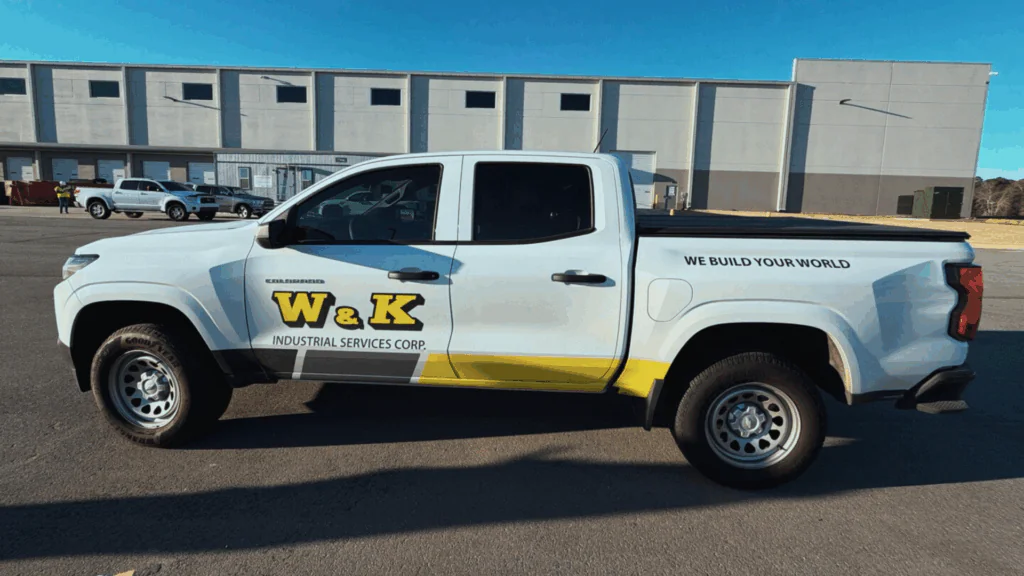
Post-Delivery Verification: Ensuring Complete Customer Satisfaction
Stress-free delivery depends on thorough final inspection. When the carrier arrived in Moore, they unloaded the Chevy Colorado and walked around the vehicle with our customer. They compared the truck’s current condition to the pre-transport photos taken in Pensacola. Every panel, mirror, and tire got checked.
The customer signed the Bill of Lading confirming satisfactory delivery. This signature closes the transport contract. If any damage had appeared, the customer would have noted it on the BOL before signing. Insurance claims require this documentation. Without noting damage at delivery, proving it occurred during transport becomes nearly impossible.
The entire process from booking to delivery took less than three days. Our AI-powered pricing system provided transparent costs upfront. No hidden fees appeared at delivery. The quoted price matched the final price. This predictability matters to customers planning vehicle transport.
Moving a 2025 Chevrolet Colorado from Florida to South Carolina demonstrates how professional auto transport handles modern trucks. The right equipment and experienced carriers make the difference between successful delivery and damaged vehicles.
Shipping Summary
Vehicle: 2025 Chevrolet Colorado
Route: Pensacola, Florida to Moore, South Carolina (500 mile)
Pensacola, FL → I-10 E → Mobile, AL → I-65 N → Montgomery, AL → I-85 N → Atlanta, GA → I-85 N → Greenville–Spartanburg, SC → Moore, SC
Service: Hot Shot 2-Car Hauler
Cost: $830.00 ($1.66 per mile)
Season: Winter
Coast-to-Coast Shipping: Aston Martin Sports Car from Los Altos, CA to Miami Beach, FL
This December, we organized the coast-to-coast transport of this beauty from the technological capital of Los Altos, California, to the sun-kissed side of Miami Beach, Florida. This covered almost 3,000 miles through different zones and climatic regions while ensuring that the high-performance vehicle was delivered to the prospective customer in showroom condition.
The Challenge: Transporting British Luxury Across America
The 2019 Aston Martin DB11 is not simply a vehicle; it is a statement piece costing over $200,000 that brings together high-quality craftsmanship and advanced performance features. It takes a lot more than a truck and a driver to move this piece from Silicon Valley in California to the most renowned beach in Florida.
Coast-to-coast driving distance: From Los Altos to Miami Beach is about 3000 miles. That means driving through California, then Arizona, New Mexico, Texas, Louisiana, Mississippi, Alabama, and ultimately Florida. Every new state entails a variety of driving environments and challenges.
December timing: Booking during the holiday season, particularly on November 29th, means dealing with peak freight demand. December is when everyone moves everything: holiday moves, year-end business moves, and Snowbirds heading to Florida. Finding an enclosed trailer during this time is not easy.
High-value vehicle protection: The DB11’s artisan-built 4.0L twin-turbocharged V8 engine, Italian leather interior, and exquisite Jet Black paint finish call for enclosed transportation. One piece of road debris, a single exposure to temperature variance, or a sudden change in the weather could lead to costly repairs in the thousands of dollars. This vehicle required climate-controlled, hard-sided enclosed transportation all the way.
California to Florida route complexity: This is more than a straight line down the highway. There are mountain passes, plains, and climate regions along the route. You’ll go from the cool coastal air of California, then on into the arid heat of Arizona, then through the unpredictable storms of Texas, and finally the muggy heat of Florida. It takes a seasoned carrier to get through all that.
Why the Aston Martin DB11 Requires Special Care
All aspects of this luxury grand tourer from Great Britain call for special care when being transported.
Crafted-by-hand assembly: Every DB11 features semi-crafted assembly at the Aston Martin plant in Gaydon, England. The paintwork requires numerous stages of painting and hand-polishing. The leather interior features craftsmanship through manual stitching. This is automotive art. One wrong move when loading the car could impact the craftsmanship that requires weeks to complete.
Ground clearance: The DB11 is low. Common loading ramps will rub against the nose splitter intake, exhaust components, or underside panels. Professional enclosed car haulers employ hydraulic rear loading racks or ultra-gentle ramps intended for handling exotic car ground clearance. Not recommended. Required.
Paint perfection: Aston Martin paint requires six layers of clear coats. This paint offers no hide: it reveals every flaw, every scratch, every chip. Open transport allows this paint to be exposed to road debris, rocks, and dirt. Enclosed transport protects the paint from damage.
Climate-sensitive interior: The DB11’s interior has Bridge of Weir leather, Alcantara, and wood or carbon-finished materials. These materials respond differently to temperature and humidity. When exposed to high temps, materials dry and crack. When exposed to low temps, materials are stiff. When exposed to high humidity, materials damage electronic devices. Climate-controlled transportation maintains constant interior conditions during transit.
Advanced Electronics: Modern Aston Martin cars are equipped with sophisticated electronics; infotainment, assistance systems, and performance electronics, which do not respond to high temperatures or moisture. Enclosed transport shields the car’s electronics, which are valued at more than $20,000, from environmental factors.
Wheels and tires protection: The DB11 comes with a standard wheel and tire package worth over $3,000. Competition tie-down straps are used, and they are firmly attached to the body points. No carrier uses chains or hooks, which may scratch high-performance wheels.
Insurance coverage: Insurance coverage for an Aston Martin has to be of premium quality. Standard insurance for automobile transport has limits of $100,000-$250,000. For a DB11, coverage of $250,000+ has to be arranged, including additional insurance for full value protection. Such cars should be transported by reputable transport firms that can provide adequate insurance protection.
The Route: Los Altos, CA to Miami Beach, FL
Transporting a high-performance car from one coast of the country to the other is not an easy procedure that one can undertake without utmost care and planning on the part of the journey.
Day 1-2: Los Altos, CA to Arizona: Leaving Los Altos, the aircraft passed through California’s Central Valley and into the state of Arizona. During this phase, the aircraft passed through the Mojave Desert, where there are extreme temperature changes on the outside of the aircraft.
Day 3 (AZ to NM/TX): Across Arizona and into NM. This is where the landscape shifts from high desert to the rolling plains of West Texas.
Day 4-5 (Texas): Texas is very large. The Air Force had to share almost 900 miles of Texas, from El Paso to San Antonio, and then towards Houston. Weather tracking was very important in Texas, as Texas is always full of unexpected storms.
Day 6: From Louisiana into Alabama. From here on, the weather becomes more and more humid; this affects the trailer’s climate control system, which is a major asset in maintaining the interior of the car, since it is made of leather.
Day 7 (Delivery Day – Florida): The final push from the Panhandle of Florida down to Miami Beach. The humidity in Florida demands special attention to climate controls.
Communication during transportation:
- The carrier offered very good updates on:
- GPS tracking link sent to customer on departure
- Location updates were sent daily via text message/ email or call.
- Weather condition reports impacting the route and time
- Revised ETA updates as the journey progresses.
- Photos are available upon request for the rest stops
- Direct communication link to the driver for any queries
No problems in transit: It should be noted that this is an unusual situation. There was no mechanical issue, inclement weather that forced route detours, or an accident. Nor were there any issues related to carrying cargo. For every mile of its almost 3000 miles, the Aston Martin was safe, sound, and temperature-controlled.
A period of seven days may appear rather long for cross-country transportation; however, it is a very good period for transporting luxury cars. Hurrying up is hazardous. Skilled drivers focus more on safety and car protection rather than speed. They get enough rest, don’t drive in bad weather conditions, and drive in smooth patterns.
Delivery Day, December 16th: The Aston Martin DB11 pulled into Miami Beach just as it had departed Los Altos.
Transport Summary
Vehicle: 2019 Aston Martin DB11
Route: Los Altos, CA 94024 to Miami Beach, FL 33139
Distance: 3000 miles (coast-to-coast)
Primary Routes: I-5 S → I-10 E → I-75 S
Service: Hard-side enclosed trailer for 6 cars
Cost: $1,800 ($0.6 per mile)
Season: Winter
Shipping a Vintage 1970 Ford Galaxie XL from Dallas, TX to Los Angeles, CA
We transported a 1970 Ford Galaxie XL convertible from Dallas to Los Angeles using an open carrier. Classic car owners need to understand that moving a classic automobile is not like moving any other car. This is what we found out on a 1,400-mile move.
A Galaxie XL is what all classic car enthusiasts can point to and say is a classic car design. It is a classic car with a convertible top that is definitely one that needs to be protected while it is being shipped. This is one aspect of older models that one should understand: the body parts involved are not replaceable, nor is it feasible to fix scratched paint by running it through the body shop.
Why Classic Cars Require Specialized Shipping
Classic car enthusiasts do not drive such cars in the same way that people drive ordinary cars. A 1970 Galaxie XL is more than just moving from one point to another; it is a historical vehicle that requires unique care.
Preparation begins even before the trailer arrives. A walk-around is performed by the driver, who takes pictures of the car’s condition, indicating original paint and chrome. A spare tire that belonged with the Galaxie was not insured for separate transport since the transport company recognized that it held value for the owner.
Regular auto transport sports cars as drive dailies designed for roads of the current era. Classics were never intended for current highway conditions. Their suspension systems are different, current paints have a different solar reaction, and current clearcoats do not act like old finishes.
Vintage specialist carriers understand this. Classic cars are placed on the vehicle carrier in such a way that they are least exposed to the winds, with soft straps instead of chains, without stacking new vehicles on classic cars where a leak could potentially damage it.

Standard Auto Transport VS. Vintage Vehicle Hauling
A 9-car open trailer was selected for the Galaxie transport instead of the enclosed transport. This caught some classic car owners by surprise. Open trailers cost less and are easier to transport quickly, but it is the skill of the transport company that matters. We selected a 9-car open trailer for the Galaxie transport instead of the enclosed․
This is a very active route from Dallas to Los Angeles with considerable traffic, including cargo. While “standard carriers” are concerned with the fastest times possible and the greatest number of deliveries, “classic haulers” care more about the delivery being safe rather than speedy. Classic haulers also avoid heavy traffic when driving through major urban areas along “I-40,” opting for fuel stops at major truck stops with enough room to park.
Our Galaxie shared the trailer, placed on the lower deck away from the ramp to minimize overtakes by other trailers. The upper deck held sport utility vehicles and trucks as fluids could spill, thereby impairing our classic car.
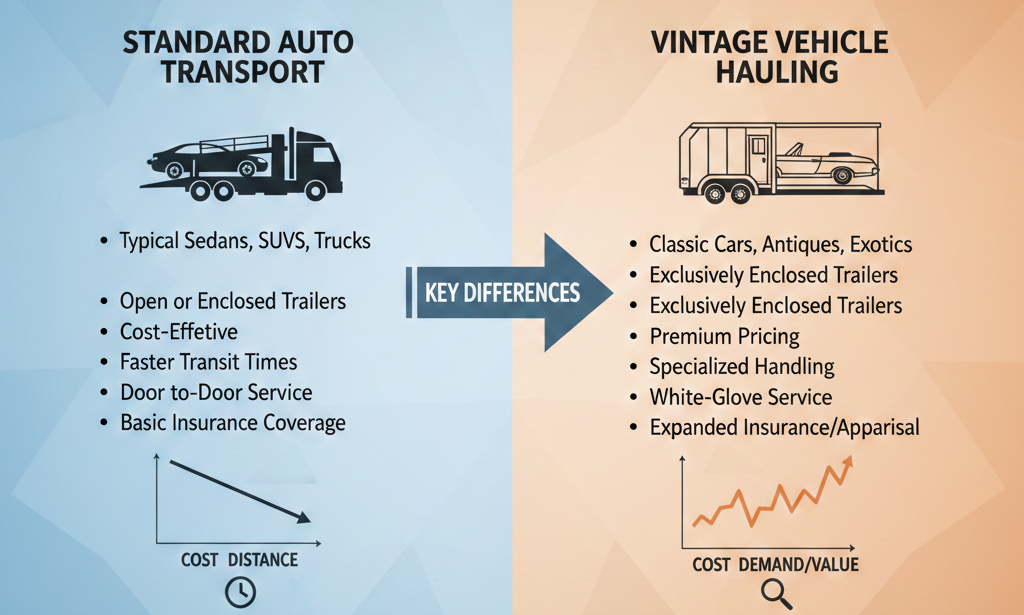
See Also: How to Haul Collectible Cars Across the States
Route Specific Insights: Dallas to Los Angeles
Spanning five states, with a distance of 1,400 miles, it is a unique classic transport route in itself. One needs to keep an eye on the tire pressure in the scorching heat of Texas. Variations in height while repositioning classic cars in New Mexico can be testing for aged braking systems. One also needs to remain alert for fluctuations in temperature from morning to afternoon in the deserts of Arizona.
“The major highway here is Interstate 40; haulers do not prefer the smaller roads that do not have adequate shoulders, as breaking down on a two-lane highway can be hazardous for something of such value.” Additionally, major highways provide easier access to emergency services in case of a need for such services.
Normally, the transport takes 5 to 7 days, with monsoon weather in Arizona adding another 2 to 3 days. Ice in the Texas Panhandle in winter can bring transport to a standstill. Spring is expected to provide the most predictable weather.
In Los Angeles, factors for delivery would include some restrictions for certain residential streets for big rigs over certain lengths. Then again, it seemed that our 9-car trailer went over some of these limits in some areas, so the drivers called ahead a day before to ensure that they could deliver in a certain spot.
What to Do If You Discover Damage After Transport
Action you should take when the car is delivered:
- Look it over to check new scratches
- Compare with the pickup photos
- Check if a fluid leaks
This should be done before you sign any Bill of Lading.
Minor damages can occur even if transported with care, as road debris can chip paint, for example, or tie-downs can damage soft rubber. Most carriers provide insurance for such damages. Damage claims should be filed within the timeframe specified in your transport agreement (generally 24-48 hours after delivery).
Pictures should be taken for comparison with pickup pics. Classic car insurance claims are not like other auto insurance claims. Components may not be available, or duplicating the original paint may not be possible. Adjusters must work with knowledgeable individuals about classic car values, or repair damage that is unique through fabrication or restoration. All forms of communication should be documented. Emailing creates a paper trail for insurance purposes.
Hopefully the 1970 Ford Galaxie XL was delivered in Los Angeles without any damage, and the spare tire also reached safely. It was important to select a trustworthy carrier in order to make the delivery process smooth or hassle-free.
Shipping Summary
Vehicle: 1970 Ford Galaxy XL Convertible
Route: Dallas, TX to Los Angeles, CA (1,400 mile)
Dallas, TX → I-20 W (Abilene → Midland/Odessa) → merge to I-10 W (Van Horn → El Paso) → continue I-10 W (Deming → Tucson → Phoenix → Blythe → Indio/Palm Springs) → I-10 W into Los Angeles, CA
Service: Open 9 Car Hauler Trailer
Cost: $519.00 ($0.38 per mile)
Season: Winter
Enclosed Transport of Street-Legal Bikes from North Miami, FL to Watertown, WI
A vivid metallic purple color, dominated the upper fairing and tail, a bright red racing contrast cut through the lower panels, the brushed aluminum mid-section, that exposes the aggressive chassis lines are what you’d expect from a proper track weapon. Carbon fiber bits are everywhere, and a blacked out SC Project exhaust system brutally screams.
Expert Notes On Bike Transport
Here are a couple of things I would like our customers to know about transporting high-performance bikes before I break this shipment into details.
This bike weighs about 440 pounds—light for a sport bike, but that lighter, narrow profile creates its own challenges. Standard wheel chocks won’t cut it, so it needs to be strapped properly at the fork tubes and rear swingarm to keep the suspension protected.
The enclosed transport quote the customer approved was $816 for the trip from North Miami, Florida to Watertown, Wisconsin (about $0.54 per mile). That price included two extra tires, 24 pounds total, at no extra charge. Serhii—the driver we’ve worked with before—called ahead to review the handling requirements and finalize the pickup details.
Why You Should Choose an Enclosed Trailer For Sport Bikes
A lot of my new customers are asking about open trailer services just because it’s cheaper, but you need to understand that you are risking your bike to weather and road debris.
Enclosed trailers have steel and aluminum walls, which is a nice guard against rain, hail, or those UV rays that tend to fade paint and strip the details on decals. A lot of them also have climate control to avoid condensation in the winter when temperatures fluctuate, and that is important if you’ve got exposed electrical bits and want to keep rust off brake rotors, chains and fasteners.
Enclosed trailers prices are about 30% to 50% more than open transport services, these numbers depend on locations area and driver availability at the moment, but before you balk at that premium, consider that just a single paint panel repair on an Aprilia RSV4 RR runs $1,500 to $3,000 at a factory-authorized shop.
The Florida to Wisconsin Route: Planning and Logistics
The pickup and final destination is around 1,400 miles and crosses six states.
Most drivers head up I-75 North in Georgia and Tennessee, switch to I-65 Kentucky and Indiana, where they make the final push into Wisconsin. Under normal conditions shipping is typically 3-5 business days and given the number of factors we cannot estimate when drivers will stop.
While the map extends along a simple east-west axis, weather now plays in as well since Wisconsin gets snow and ice while Florida remains toasty. Drivers and their dispatchers are checking the forecast, calling to pass when they will pick up with these storms. The line was best operated in the spring or autumn when it was more likely to have a period of stable weather and be not too hot, nor get below ~ 51–55°F (and much cooler at altitude) for its length.
Real-Time Updates and Communication During Transport
After the first call, the driver confirmed the pickup day and time within a couple of hours after assigning it, and the customer was notified about Serhii’s arrival time and estimated delivery day. As this is the driver’s favorite direction, the shipping process promised timely and accurate delivery estimates and active communication about any potential delays during the shipping. Serhii made sure the customer knew exactly what to expect: he confirmed with us pickup details, delivery instructions, and even asked how often the customer wanted to get updates.
Today, many carriers send text notifications at key milestones, but with our company you’ll get a text message and an email when your bike is picked up, another one when halfway to delivery, and a final confirmation before the day and on delivery day. We have drivers that provide GPS tracking links, letting you follow your motorcycle’s journey in real time or 10 minute interval updates.

Careful Unloading and Final Inspection
The drivers who do it for an extended period of time use lift gates and ramps with gentle slopes that would fit the bike’s aggressive geometry and wheel chocks are put in the right spot, and tie-down straps are released in the following manner: rear wheel first, followed by front.
Once the motorcycle is properly secured, an examination becomes necessary. Photographs and videos are then done to “Bill of Leading”(BOL) it as a formality. It represents an examination done at an equal level as before it was shipped from Miami.
Due to the covering that was put on before shipping, all of the panels made out of carbon fibers, as well as all the components and painted surfaces, were shipped without any scratch. Not only that, but with the enclosed trailer, there was no chance for dirt, debris, or any elements at all to make contact with the bike. By the time it reached Wisconsin, the RSV4 RR looked as if it had never left the state of Florida.
Transport Summary
Vehicle: 2023 Aprilia RSV4 RRs
Route: North Miami, FL to Watertown, WI (1,514 mile)
I-75 or I-95 North → I-24 or I-65 through GA/TN/KY → I-57 or I-94 through IL → I-94 or I-41 into Wisconsin
Service: Hard Side Specialized Enclosed Trailer
Cost: $816.00 ($0.54 per mile)
Season: Autumn
2-Day Auto Transport: 2019 Lexus RX 350 Delivered from Columbus, OH to Dallas, TX in Record Time
On December 8th, a customer booked auto transport services for their 2019 Lexus RX 350 from Columbus, Ohio, to Dallas, Texas. The next day, a transport service was assigned, and the pick-up took place. By December 10, the 2019 Lexus RX 350 had arrived at Dallas, thereby indicating that with proper planning and organization, expedited auto transport services can be very successful.
The Complete Timeline
Day 1 (Sunday, December 9): Immediately after loading, it departed in the afternoon with an approximate distance of 600-700 miles. It traveled smoothly via I-70 W and entered Missouri after Illinois and Indiana. By late evening, it passed St. Lucie.
Day 2 Monday, December 10
The driver began early and took the rest of the drive. The journey took them through Oklahoma and then into Texas on I-40 and I-35. From Columbus to Dallas, it is approximately 1,075 miles. The driver then telephoned the customer on December 10, in the morning, to confirm an ETA at midday.
December 10 – All Done
The driver reached Dallas on time. The driver made use of the ramps to get the Lexus from the truck. The customer met the driver on arrival.
The customer and driver inspected the car together. The customer and driver made sure that there were no clashes as it transported.
Good news: the car looked perfect.
Both parties signed the Bill of Lading, stating that everything went well, and the car was in excellent condition. The driver handed them the keys and ensured that the engine started properly. It took no more than 20 minutes. The Lexus RX 350 drove 1,075 miles without an issue, arriving a day before most deliveries, and it cost exactly what we paid at booking.
Several factors made it easy to have a smooth shipping experience
- Big Cities: Both Columbus and Dallas have an enormous amount of truck traffic. Having truck traffic as an advantage, it becomes easy to locate carriers and transport cars.
- Early December Timing: December can be pretty nuts, but it’s still doable early on. It’s easier on your pocket and your planning schedule before it gets crazy at the end of the month.
- Vehicle Condition: The Lexus was in working condition and drove right onto the trailer. But if it’s not working properly, they have to winch it on. That might be an added cost and make it an even longer wait for a pickup.
- Good Communication: There was no delay because of good communication among the customer, broker, and carrier. All parties knew what was going on and when.
- The Direct Route: It didn’t have to make a whole list of stops on its journey. Just a single pick-up and a single delivery. That cuts a whole big amount of time from its travel.
- No Weather Worries: December weather can be very unpredictable. But as it turned out, we were treated with perfect running conditions. No snow, no ice, no postponements.
- Standard Vehicle: The size of the Lexus RX 350 SUV is normal. There isn’t any special equipment required. It doesn’t need large permits. It will fit perfectly on any trailer.
What Made This Fast
Columbus to Dallas is about 1,075 miles. Most shipments on this route take 3-5 days from booking to delivery. This one took two. Timing and availability were the only differences. It just happened that the carrier was already in the direction of the customer and had space. The customer wanted to go, the weather cooperated, and everything just clicked into place.
The Customer Review
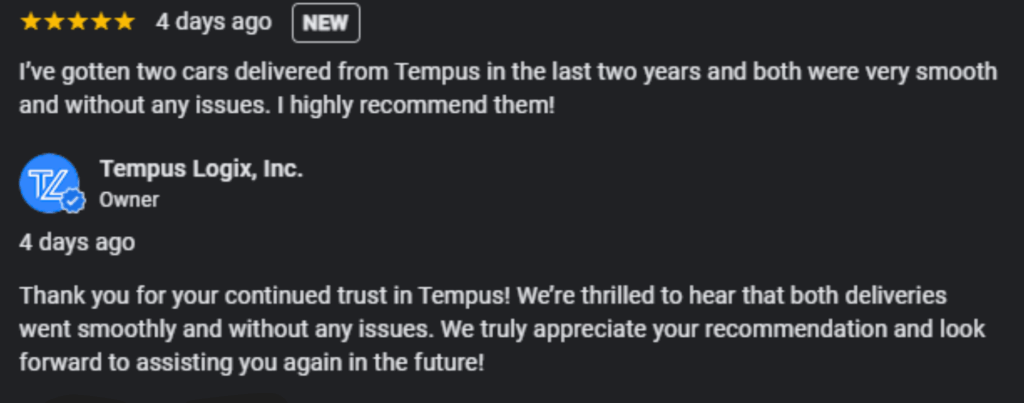
It has a rating of 4.9 stars on Google with more than 2,025 reviews from verified customers.
The transport from Columbus to Dallas lived up to what customers have been saying all along: communicate with them, don’t surprise them, and the car will arrive at the agreed-upon time. It’s a relatively
Shipping Summary
Vehicle: 2019 Lexus RX 350
Route: Columbus, OH 43229 to Dallas, TX 75218 (1,075 miles)
I-70 W – I-35 S
Service: Open trailer for 7 vehicles
Cost: $800 ($0.75 per mile)
Season: Winter



